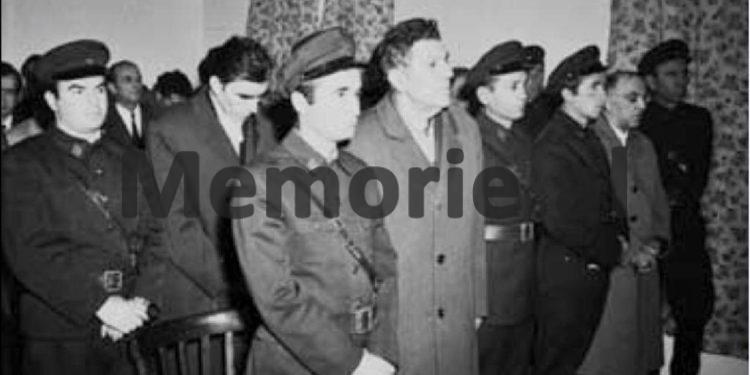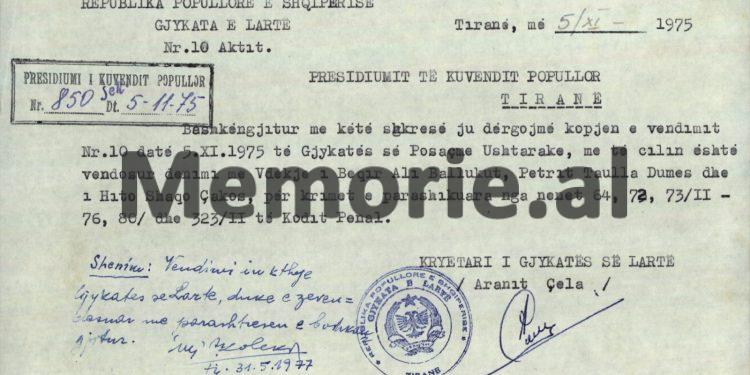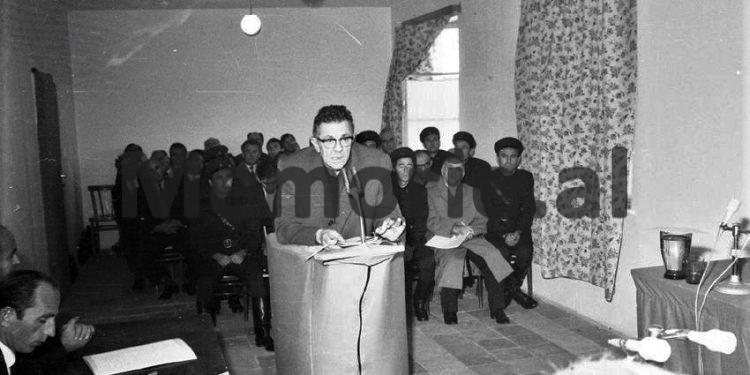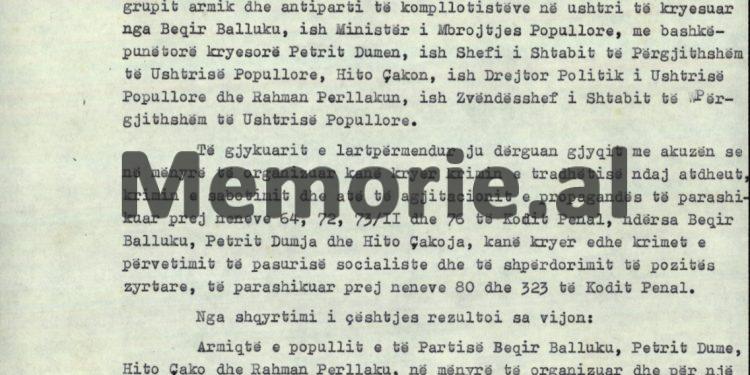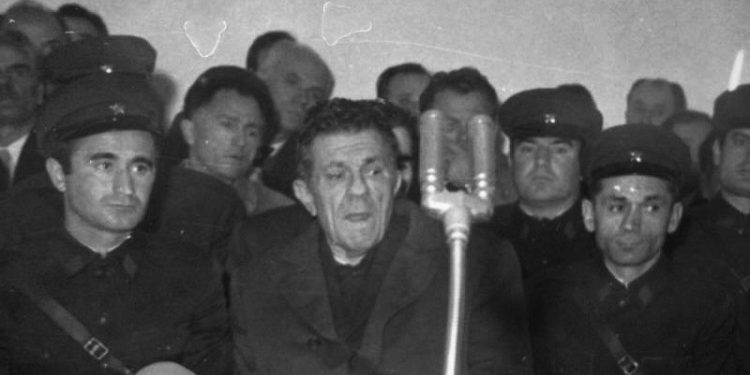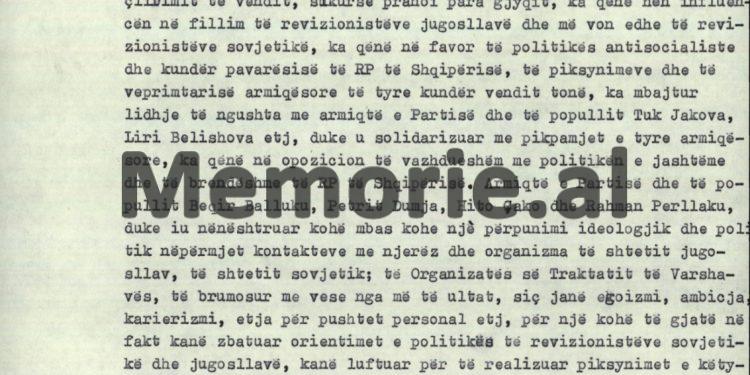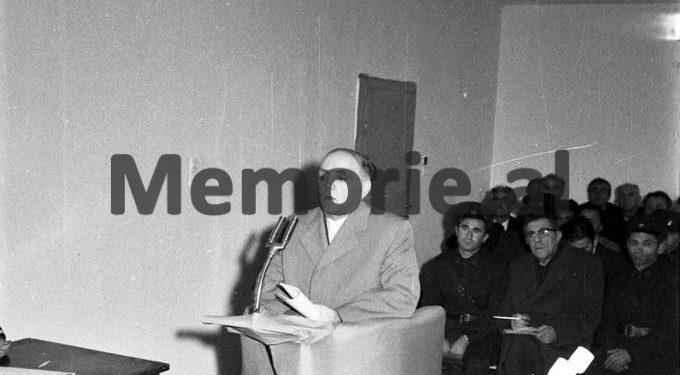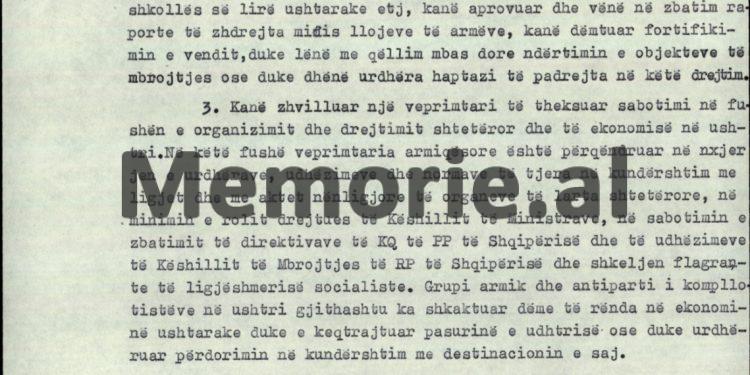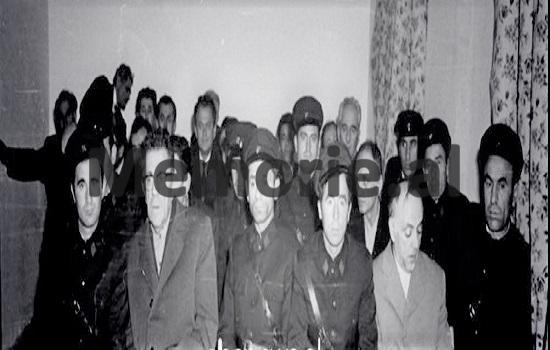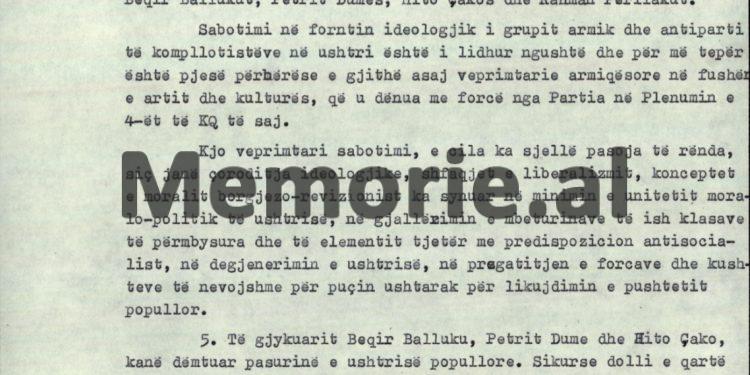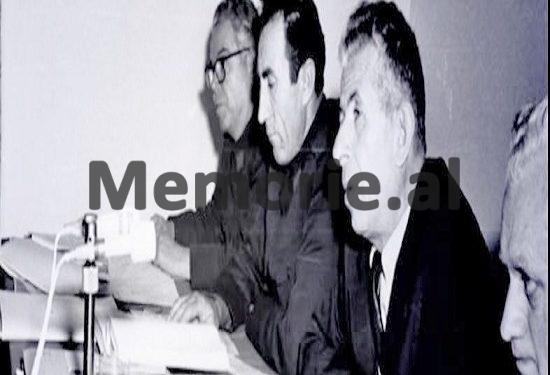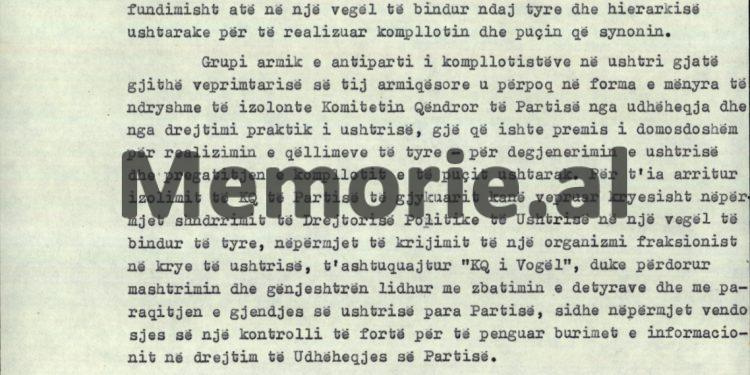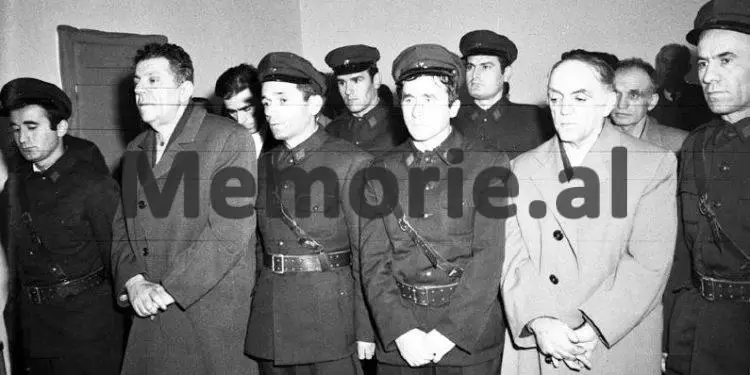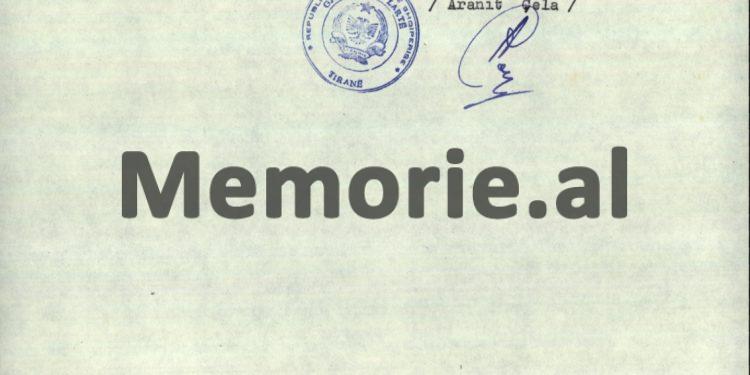By Dashnor Kaloçi
The first part
Memorie.al/ On November 5, 1975, exactly 49 years ago, the president of the Supreme Court of the People’s Republic of Albania, Arani Çela, by means of a letter marked “Top Secret”, addressed to the Presidium of the People’s Assembly, attached a copy of the decision of that court, with a summary of the indictment of the death sentence, by firing squad, of the three former generals, the highest leaders of the Ministry of Defense, Minister Beqir Ali Balluku, the Chief of Staff of the General of the Army, Petri Taulla Dume and the Director of the Political Directorate, Hito Shaqo Çako, as well as the 25-year prison sentence of Rrahman Parllak, former Deputy/Chief of the General Staff of the Army, in the Ministry of People’s Defense.
The trial against them, held from October 25 to November 5 of that year, in an improvised hall in the premises of Ward 313 of Tirana, (otherwise known as the “Old Prison” or “Kaushi”), where they also the investigative process, remained isolated and under strict security measures, since the period of their arrest, on December 6, 1974. The arrest of Balluk, Duma, Čako and Parllak, came after a period of nearly six months, collection of assets and plenums, developed with the highest cadres of the Ministry of People’s Defense, the secretariat of the Central Committee of the ALP and the Political Bureau, where Enver Hoxha personally assisted and directed most of them.
The attack on Beqir Balluk, who for years held the post of Minister of People’s Defense and first deputy prime minister in the government headed by Mehmet Shehu, as well as a member of the Political Bureau of the ALP Central Committee, began in June-July of in 1974, with the extended meeting of the Army Active, which was held in the former “Bird House” of the city of Durrës. That meeting was chaired by Mehmet Shehu and Hysni Kapo, where Balluku, for the first time, since 1945, was not in a meeting presidium, but in the hall, where he was forced to answer dozens of questions, asked by subordinates his. Everything that was happening there in that hall and that would continue until the day of the arrest, was pre-prepared based on a well-crafted scenario by the main leaders of the senior leadership of the ALP, such as Mehmet Shehun and Hysni Kapon , personally conceived and directed by Enver Hoxha.
After that activity with the highest cadres of the Army, Balluku was also analyzed in the meetings of the Political Bureau of the Central Committee of the ALP, where Enver Hoxha was the first to direct the attacks against him, accusing him of; “the head of the coup group in the Army” and “the biggest traitor that Albania had until that time”. After those meetings of the Political Bureau, Balluku was also analyzed in the Fifth Plenum of the Central Committee of the ALP, which was held on July 25, 1974, where he was attacked by the majority of the members of the plenum.
At the end of that meeting, Balluku was expelled and dismissed from all party and state functions, but, unlike many of the former functionaries and senior figures of the communist senior leadership, (who had been hit and convicted years before, who were arrested and handcuffed as soon as they left the assembly hall), he was released to go home! Where after ten days, together with part of his family, he would be interned in the town of Roskovec, in the district of Fier, where he was arrested on December 6, 1974.
Now all this and more for Beqir Balluk, the former Minister of People’s Defense and the first deputy prime minister of the government headed by Mehmet Shehu, who until 1974, was considered one of the closest collaborators and most loyal people of Enver Hoxha, are very popular, since after the 90s, dozens and dozens of testimonies and archival documents were also published, which shed light on his life and career, from the period when he was the main leader of the Guerrilla Units of of Tirana and commander of the Second Assault Brigade of the National Liberation Army, as well as the entire period in charge of the Ministry of People’s Defense, until July 1974.
What has remained an almost unsolved and unknown mystery, which continues to be discussed even today after almost five decades, are the main reasons and causes that forced Enver Hoxha to hit Balluk and the two main leaders of the Ministry of Defense, Petri Dumen and Hito Chako, sentencing them to death, as; “The leaders of the coup group in the Army”! Along with this mystery, which will probably never be solved, the archival documents with the minutes of the meetings of the Presidium of the People’s Assembly of the People’s Republic of Albania, where the requests and prayers for the pardon of life, were discussed, are almost unknown the side of the three former leaders of the Ministry of Defense, Balluku, Dume and Çako.
Based on this, Memorie.al is publishing in several numbers these archival documents, where there are discussions of all the members of the Presidium of the People’s Assembly, starting from its head, Haxhi Lleshi, (President), Rita Marko (Vice President), Telo Mezini (Secretary), as well as members; Jovan Bardhi, Muharrem Sefa, Naunka Bozo, Nuredin Hoxha, Spiro Moisiu and Zinja Franja.
THE LETTER OF THE PRESIDENT OF THE HIGH COURT, ARAN ÇELA, SENT TO THE PRESIDIUM OF THE POPULAR ASSEMBLY, WITH THE ACCUSES AGAINST BEQIR BALLUKU, PETRI DUMES AND HITO ÇAKOS AND THEIR DEATH SENTENCE
THE PEOPLE’S REPUBLIC OF ALBANIA Tirana, on 5.11.1975
THE SUPREME COURT
No. 10 of the Act
PRESIDIUM OF THE POPULAR ASSEMBLY
TIRANA
Attached to this letter, we are sending you a copy of the decision no. 10 dated 5.11.1975 of the Special Military Court, by which the death penalty was imposed on Beqir Ali Balluku, Petri Taulla Dumes, and Hito Shaqo Çakos, for the crimes provided by articles 64, 72, 73/2, 76, 80, and 323/2 of the Criminal Code.
PRESIDENT OF THE SUPREME COURT
Aranit Cela
THE PEOPLE’S REPUBLIC OF ALBANIA Tirana, on 10.11.1975
SUPREME COURT “Top Secret”
No. 323 Prot Specimen No. 1
PREFIX
PRESIDIUM OF THE POPULAR ASSEMBLY
TIRANA
The Special Military Court, established by Decree No. 5330 and dated August 27, 1975, of the Presidium of the People’s Assembly, from October 25 to November 5, 1975, considered the criminal case that belongs to the enemy and anti-party group of conspirators in the army, headed by Beqir Balluku, former Minister of Defense Popular, with key collaborators, Petrit Dumen, former Chief of General Staff of the People’s Army, Hito Çakon, former Political Director of the People’s Army, and Rrahman Përllakun, former Deputy Chief of the General Staff of the People’s Army.
The above-mentioned defendants were sent to court on the charge of having, in an organized manner, committed the crime of treason against the motherland, the crime of sabotage, and that of propaganda agitation, and provided for by articles 64, 72, 73/2, and 76, of Criminal Code. While Beqir Balluku, Petrit Dume, and Hito Çako, have also committed the crimes of embezzlement of socialist property and abuse of official position, provided for by articles 80 and 323 of the Criminal Code.
From the examination of the case, the following resulted:
Enemies of the People and the Party, Beqir Balluku, Petrit Dume, Hito Çako, and Rrahman Përllaku, in an organized manner and for a long time, have developed activities against the People’s Republic of Albania, against the Party of Labor of Albania, ultimately aiming, through the putsch, to liquidate the dictatorship of the proletariat and socialism, establish the bourgeois-revisionist fascist dictatorship, and restore capitalism in Albania.
In order to achieve their criminal views, the conspirators and coup plotters, Beqir Balluku, Petrit Dume, Hito Çako, and Rrahman Përllaku, have developed a wide and multi-sided hostile activity, inside and outside the army, specifically:
- They have sabotaged the leadership and control role of the Party in the army. These enemies fought to introduce the military hierarchy into the Party, and to turn the basic organizations and Party Committees into appendages of the commands, thereby putting the command over the Party.
By openly violating Party norms, directives, and decisions in order to freely carry out their plans, these enemies tried to degenerate the Party into an army, to give it both form and content the characteristics of a revisionist party, to eliminate its Marxist-Leninist worldview, to remove it from the norms and principles of its construction and operation, to strike at its discipline and unity, to ultimately turn it into a tool obedient to them and the military hierarchy , to carry out the plot and coup they intended.
The hostile anti-party group in the army, throughout its hostile activity, tried in various forms and ways to isolate the Central Party Committee from the leadership and from the practical direction of the army, which was a necessary premise for the realization of the goals of them, for the degeneration of the army and the preparation of the conspiracy and the military coup.
In order to achieve the isolation of the Central Committee of the Party, the defendants acted mainly through the transformation of the Political Directorate of the Army, into an obedient tool of theirs, through the creation of a factional body at the head of the army called; “Small Central Committee”, using deception and lies, regarding the implementation of duties and the presentation of the state of the army to the Party, as well as through the establishment of strong control, to obstruct the sources of information towards the Party leadership .
- They have developed a pronounced sabotage activity, in the direction of the defense of the country, causing serious damage both in the field of military art, as well as in the field of military preparation and fortification of the country.
These enemies, as they themselves claim, being against the general line of the Party, also opposed the military line which is an integral part of it.
For several years in a row, under the auspices of a fierce enemy of the Party and People’s Power, they worked and formulated, in the form of a document, a military line of their own, which is hostile, diametrically opposed to the military policy of the Party and of the People’s Republic of Albania.
It should be emphasized that the political and ideological basis of this military line is bourgeois-revisionist, while its objective is actually the sabotage of the country’s defense, the surrender of the territory of the People’s Republic of Albania to the enemy without a fight, in case of aggression.
In flagrant contradiction with the principles and requirements of popular military art, with the decisions and tasks set by the Central Committee of the ALP and the Defense Council, programs and rules have been introduced into the army, which have damaged military training and in general the preparation of cadres and soldiers, have sabotaged the Party’s directives on the preparation of the entire people for defense, undermining the preparation of volunteer forces, the implementation of the Free Military School, etc.
- They have approved and implemented skewed ratios between types of weapons, they have damaged the fortification of the country, deliberately neglecting the construction of defense facilities or, by giving openly unjust orders in this direction.
- They have developed a pronounced sabotage activity in the field of organization and state and economic direction in the army.
In this area, the hostile activity is focused on issuing orders, instructions, and other norms contrary to the laws and by-laws of the higher state bodies, in undermining the leadership role of the Council of Ministers, in sabotaging the implementation of the directives. of the Central Committee of the ALP and the instructions of the Defense Council of the People’s Republic of Albania, and the flagrant violation of socialist legality.
The enemy group and the anti-party conspirators in the army have also caused serious damage to the military economy by mishandling the wealth of the army, or ordering it to be used contrary to its intended purpose.
The sabotaging activity of the anti-party and enemy group in the field of state organization and direction, as well as the economy of the army, aimed at damaging the military economic potential, isolating the army from the higher state bodies, its gradual transformation into a “state within a state” , all this with the ultimate goal of preparing a military coup for the liquidation of popular power.
- They have also developed a wide and continuous activity on the ideological front in the army. In open opposition to the interests of the Party and the state, the conspiratorial group in the army, opposing the ideology of our socialist and Marxist-Leninist order, for a very long time introduced the bourgeois ideology into the army in various forms and ways revisionists became strong supporters of imperialist-revisionist propaganda in the army.
The checks carried out proved that until the middle of 1974 in the units and departments of the popular army, 82,000 books with revisionist ideological content were found “translated, adopted and distributed” by order of Beqir Balluku, Petrit Dumes, Hito Cakos, of Rrahman Perllak.
The sabotage on the ideological front of the enemy anti-party group, of the conspirators in the army, is an integral part of all that hostile activity in the field of art and culture, which was strongly condemned by the Party at the Fourth Plenum of the Central Committee.
This sabotage activity, which has brought very serious consequences, such as ideological perversion, manifestations of liberalism, concepts of bourgeois-revisionist morality, aimed at undermining the moral-political unity of the army, at reviving the waste of the former overthrown classes and of the anti-socialist element, in the degeneration of the army, in the preparation of forces and conditions for the creation of a military putsch for the liquidation of popular power.
- The defendants Beqir Balluku, Petrit Dume, and Hito Çako have damaged the property of the popular army. As it became clear, during the course of the trial, the political and ideological degeneration of these enemies is connected with their moral degeneration. All three of the aforementioned have stolen and squandered the socialist wealth, and created conditions for other unscrupulous persons to damage the wealth of the people.
The hostile activity of the conspiratorial and putschist group of Beqir Balluku, Petri Dumes, Hito Çakos, and Rrahman Përllaku, is closely related to the anti-party activity developed in our country, during the last years, either in the field of art and culture, as well as in that of the national economy. It, in itself, represents the most dangerous part that the enemies of the Party and the Albanian People have developed.
The conspiratorial and putschist activity of Beqir Balluk, Petrit Dumes, Hito Çakos, and Rrahman Përllak, not only coincides but is organically connected on the same political and ideological basis, with all the hostile activity that takes place against the People’s Republic of Albania, the ALP, and the Albanian People, from the modern imperialists and revisionists.
Among the defendants, Beqir Balluku, since the first years after the liberation of the country, as he admitted before the trial, was under the influence of the Yugoslav revisionists and then the Soviet revisionists. It has been in favor of the anti-socialist policy and against the independence of the People’s Republic of Albania, their goals and their hostile activity towards our country.
He has maintained close ties with the enemies of the Party and the People, Tuk Jakova, Liri Belishova, etc., being in solidarity with their hostile views, he has been in constant opposition to the foreign and domestic policy of the People’s Republic of Albania.
Enemies of the Party and the People, Beqir Balluku, Petrit Dume, Hito Čako, and Rrahman Përllaku, undergoing from time to time an ideological and political processing, through contacts with people and organizations of the Yugoslav state, the Soviet state, the Warsaw Pact , mixed with vices from the lowest, such as selfishness, ambition, careerism, personal power, for a long time in fact, have implemented the orientations of Yugoslav and Soviet revisionist politics, have struggled to realize their goals against the People’s Republic of Albania.
The court, based on the results of the investigation and the development of the trial, relying on all the documents in the file, came to the conclusion that the defendants Beqir Balluku, Petrit Dume, Hito Çako, and Rrahman Përllaku are agents of the enemies sworn to the Party and our People, the Yugoslavs and the Soviets.
The defendants Beqir Balluku, Petrit Dume, Hito Çako, and Rrahman Përllaku, both in the investigation and during the trial, being faced with a multitude of irrefutable facts and documents, were forced to fully admit their guilt and the great damage that have brought to the People’s Army and the People’s Republic of Albania.
Finally, the Special Military Court, considering the charge fully proven, found the defendants guilty of the most serious crimes committed against the Socialist Fatherland, the People, and the Party, and sentenced them: Beqir Balluku, Petrit Dumen, and Hito Çakon, with death by shooting, while Rrahman Perllakun with 25 years of imprisonment.
The pleas of the convicts for the pardon of life were rejected by the Presidium of the People’s Assembly of the RPSH, and the court’s decision was executed. Memorie.al
PRESIDENT OF THE SUPREME COURT
Aranit Cela




